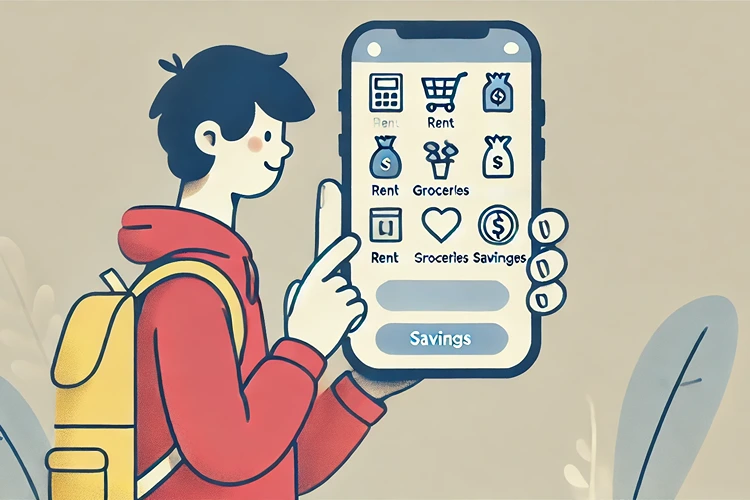College life can be both exciting and challenging, especially when it comes to managing finances. With tuition, books, housing, and social activities all vying for your attention (and your wallet), it’s easy to feel overwhelmed. But don’t worry; budgeting doesn’t have to be complicated. In fact, learning how to save money in college can set you up for financial success long after graduation. In this guide, we’ll walk you through the basics of budgeting, share practical tips on saving money, and help you build a financial plan that works for you. Whether you’re new to budgeting or just need a refresher, this guide has something for everyone.
Why Budgeting is Crucial for College Students
Budgeting might not be the most glamorous part of college, but it’s one of the most important. Without a budget, it’s easy to overspend and end up in debt, which can add unnecessary stress to your college experience. A budget helps you understand where your money is going, ensures you have enough for essentials, and allows you to save for the future.
Helpful Hint:
Start by tracking your expenses for a month to see where your money is going. This will help you create a realistic budget that reflects your actual spending habits.
What is a Budget, and Why Do You Need One?
A budget is simply a plan for your money. It outlines your income (like scholarships, part-time jobs, or allowances) and your expenses (like rent, groceries, and entertainment). By creating a budget, you can see exactly how much money you have coming in and how much is going out, which helps you avoid overspending.
How to Create a Budget That Works for You
Creating a budget might sound daunting, but it’s easier than you think. Follow these steps to build a budget that fits your lifestyle and helps you save money:
Step 1: Calculate Your Income
The first step in creating a budget is knowing how much money you have to work with. This includes any income you receive, such as:
- Part-time job earnings
- Scholarships or grants
- Allowances from family
- Student loans (although it’s better not to rely on loans for daily expenses)
Knowing your total income will help you determine how much you can spend each month.
Step 2: List Your Expenses
Next, list all your expenses. These can be divided into two categories: fixed expenses and variable expenses.
Fixed Expenses
Fixed expenses are the bills you have to pay each month, like:
- Rent or dorm fees
- Utilities
- Internet
- Insurance
Variable Expenses
Variable expenses can change from month to month and include things like:
- Groceries
- Transportation (gas, bus fare)
- Entertainment (movies, eating out)
- School supplies
Step 3: Prioritize Your Spending
Now that you know your income and expenses, it’s time to prioritize. Essentials like rent, groceries, and utilities should always come first. After covering the necessities, allocate money for savings and discretionary spending.
Step 4: Track Your Spending

Once you’ve created your budget, it’s crucial to stick to it. Track your spending to make sure you’re staying within your limits. There are plenty of apps that can help you monitor your expenses and keep your budget on track.
Helpful Hint:
Consider using budgeting apps like Mint or YNAB (You Need A Budget) to help you stay organized and manage your finances on the go.
Tips for Saving Money in College
Saving money in college doesn’t have to mean missing out on fun experiences. Here are some practical tips to help you save money while still enjoying your college years:
How to Cut Down on Living Expenses

Living expenses are one of the biggest costs in college, but there are ways to cut down without sacrificing comfort.
Roommate Living
Sharing an apartment with roommates can significantly reduce your rent and utility costs. Plus, it’s a great way to make new friends!
Meal Planning
Eating out can quickly drain your budget. Instead, plan your meals and cook at home. Not only is it cheaper, but it’s often healthier too.
Stats:
According to a study by the College Board, the average college student spends about $4,500 per year on food. By cooking at home, you could cut this cost by up to 50%.
How to Save on Textbooks and Supplies
Textbooks can be a significant expense, but there are ways to save:
- Buy used textbooks or rent them instead of buying new ones.
- Check online marketplaces for cheaper options.
- Sell your textbooks at the end of the semester to recoup some of your costs.
Maximizing Student Discounts
As a college student, you’re eligible for a variety of discounts on everything from software to clothing. Always ask if a student discount is available when making a purchase. It might surprise you how much you can save!
Building a Savings Plan
Saving money in college might seem tough, but it’s entirely possible with a solid plan in place. Here’s how to start building your savings:
Start Small, Think Big
You don’t need to save huge amounts to start building good habits. Even setting aside a small amount each month can make a big difference over time.
Open a Savings Account
Consider opening a savings account if you don’t already have one. Look for accounts with no fees and good interest rates. This will give you a safe place to store your savings and earn a little extra money.
Set Savings Goals
Setting specific savings goals can help you stay motivated. Whether you’re saving for a trip, a new laptop, or just a rainy day, having a goal makes it easier to stick to your savings plan.
Sample Monthly Budget for College Students
| Category | Budgeted Amount | Actual Amount | Notes |
|---|---|---|---|
| Rent/Housing | $600 | $600 | Shared apartment with two roommates |
| Utilities (Electricity, Water, Internet) | $100 | $95 | Includes high-speed internet |
| Groceries | $200 | $180 | Meal planning to save costs |
| Transportation | $50 | $60 | Additional bus fare for unexpected trips |
| Entertainment | $50 | $45 | Includes Netflix subscription |
| Miscellaneous | $100 | $120 | Additional school supplies needed |
| Savings | $100 | $100 | Automatic transfer to savings account |
Helpful Hint:
Use the 50/30/20 rule as a guideline: allocate 50% of your income to needs, 30% to wants, and 20% to savings. Adjust the percentages based on your specific circumstances.
Managing Unexpected Expenses
Life is full of surprises, and college is no different. Unexpected expenses can pop up at any time, whether it’s a car repair, a medical bill, or an emergency trip home. Managing these expenses effectively is key to staying on track with your budget.
How to Prepare for Unexpected Costs
The best way to handle unexpected expenses is to plan for them in advance. Here’s how:
Build an Emergency Fund
An emergency fund is a separate savings account that you can dip into when unexpected costs arise. Aim to save at least $500 initially, and gradually increase this amount as you can. Having this cushion will give you peace of mind and prevent you from going into debt when surprises happen.
Review and Adjust Your Budget
If an unexpected expense arises, take a moment to review your budget. See if there are areas where you can temporarily cut back, such as dining out or entertainment, to cover the cost. Adjusting your budget quickly can help you avoid falling behind.
Using Financial Aid and Scholarships Wisely
Financial aid and scholarships are a lifeline for many college students. However, it’s important to use this money wisely to avoid unnecessary debt.
Prioritize Essentials
Use your financial aid to cover essential expenses first, such as tuition, books, and housing. Avoid using it for non-essentials like shopping or dining out. By focusing on necessities, you’ll stretch your financial aid further.
Look for Additional Scholarships
Don’t stop at the scholarships you received when you started college. There are often additional scholarships available based on your major, extracurricular activities, or academic achievements. Take the time to apply for these as they can significantly reduce your financial burden.
Stats:
According to the National Center for Education Statistics, approximately 58% of undergraduates received financial aid in the form of grants and scholarships in the 2019-2020 school year. Leveraging these resources wisely can help reduce student debt.
Smart Ways to Make Extra Money in College
Sometimes, despite your best efforts, your budget may still feel tight. In these cases, finding ways to make extra money can be a game-changer. Here are some ideas that fit well with a busy college schedule:
On-Campus Jobs
Many colleges offer on-campus job opportunities that are flexible and designed to fit around your class schedule. Whether it’s working in the library, the dining hall, or as a research assistant, on-campus jobs are convenient and can help you earn extra cash.
Benefits of On-Campus Jobs
- Convenience: You don’t have to travel far, saving you time and transportation costs.
- Flexibility: These jobs are often more understanding of your class schedule and academic commitments.
- Experience: On-campus jobs can also provide valuable work experience that you can add to your resume.
Freelancing and Side Gigs
If you have a skill like writing, graphic design, or tutoring, freelancing can be a great way to earn extra money. Websites like Upwork, Fiverr, and Tutor.com can connect you with clients looking for your expertise. Plus, freelancing offers flexibility—you can work whenever you have free time.
Finding Balance
While making extra money is great, it’s important not to let work interfere with your studies. Balance is key, so prioritize your schoolwork and only take on jobs that fit into your schedule.
Sell Unused Items
Another simple way to make some extra cash is by selling items you no longer need. Whether it’s old textbooks, clothes, or electronics, there are plenty of platforms like eBay, Facebook Marketplace, or Poshmark where you can sell your stuff. It’s a win-win—you declutter your space and make some money in the process.
Understanding Credit and Avoiding Debt
Credit can be a useful financial tool if used responsibly, but it can also lead to debt if not managed carefully. As a college student, it’s essential to understand how credit works and how to avoid common pitfalls.
What is Credit and How Does it Work?
Credit allows you to borrow money that you agree to pay back later, usually with interest. This can come in the form of credit cards, student loans, or personal loans. While credit can help you cover large expenses, it’s important to use it wisely to avoid falling into debt.
Building Credit Wisely
Building a good credit history during college can set you up for financial success in the future. Here’s how:
- Pay your bills on time. Your payment history is the most significant factor in your credit score.
- Keep your credit card balances low. Ideally, you should pay off your balance in full each month.
- Avoid applying for multiple credit cards at once. Each application results in a hard inquiry, which can temporarily lower your credit score.
Helpful Hint:
If you’re new to credit, consider applying for a student credit card. These cards are designed for beginners and often have lower credit limits and more lenient approval requirements.
How to Avoid Debt Traps
Debt can accumulate quickly if you’re not careful. To avoid debt traps, follow these guidelines:
Only Charge What You Can Afford
It might be tempting to use credit for non-essentials, but only charge what you know you can pay off when the bill arrives. This will help you avoid carrying a balance and accruing interest.
Use Loans Wisely
Student loans can be helpful, but only borrow what you need. Remember, you’ll have to pay this money back with interest after graduation, so be mindful of how much you borrow.
FAQs
Wrapping Up
Managing your finances during college might seem overwhelming at first, but with the right approach, it becomes manageable and even empowering. Budgeting isn’t just about cutting back—it’s about taking control of your financial future, ensuring you can cover your expenses, save for the unexpected, and still have money left for the things that make college life enjoyable. By implementing the tips and strategies discussed, you’ll be better equipped to handle the financial challenges of college, set yourself up for a stable financial future, and maybe even help your friends do the same. Remember, every small step you take towards managing your money wisely today will pay off in the long run.
